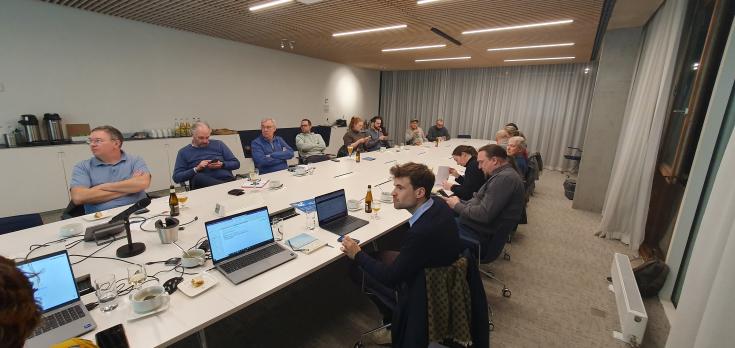New Stakeholder meeting in Mechelen!

Within the scope of SPOTLOG, on 6 February the city of Mechelen organised a co-creation workshop with (web)shop owners and citizens on the impact of e-commerce and how we can make it more sustainable and efficient.
Several challenges and possible solutions were discussed during the meeting:
Challenges sending parcels shop owners
- Price for shipping cost: depends on size, weight, domestic or foreign therefore often cooperation with different courier companies.
- Dispatch in parcel locker is a problem when the machines are full. This certainly occurs in end-of-year periods.
- Delivery in car-free areas is difficult. Couriers often do a stretch on foot, get fined and/or violate traffic rules.
- Shipping resident challenges
When delivering to a locker when it is full, then the parcel is delivered to a service point much further away from the home address
- Often you don't get to see the 'delivery in locker' option in the checkout of a webshop.
- There are too few lockers and they are only for Bpost. Open up lockers to other courier companies.
- What are the conditions for the delivery companies? Is this correct?
Next day delivery
- Residents: "is not necessary"
- Shop owner:
o "80% want it next day"
o Stock costs money, so needs to go out as soon as possible
o Surely there is a daily pick-up round
o Surely also 1 shop owner who does not promise next-day-delivery.
o Quality takes precedence, right?
Free delivery
- Nothing is free
- Shipping costs are included in the price of the product
- Shop owner gives margin away on transport.
- Returns are often free too. Must at bol.com even.
- Transport costs specified:
- Depends on the supplier
- Large company: regardless of price, there is an overall price
- Some suppliers charge extra to deliver it within the time slot
- At 10am: a lot of vans in car-free zone (GLS comes with 10 vans!!!)
Sustainable delivery
- Is important
- Is delivery by van necessarily less traffic-safe? Delivery by scooters and electric bikes is also sometimes dangerous; riding on pavements.
- People are willing to pay more if the parcel is delivered sustainably.
- People are also willing to wait longer if the parcel is delivered sustainably. Some suppliers already offer this. But is it really more sustainable then?
What else is important in a delivery?
- Ideal service
o That the parcel arrives in its entirety.
o Fair working conditions. One assumes that this is in order. For example: Deliveroo has had to stop in the Netherlands because of working conditions.
The hub principle
- City should go along with this and should enforce it. Otherwise, a hub will not work.
- You don't want 15 hubs, do you? Rather 1 operator, 1 flow of goods. Is this not a monopoly then? Is this allowed?
- What about track & trace? Which stops at the hub?
- During a street reconstruction, shop owners could work through a hub. 2 out of 18 shop owners participated in that. Last mile has to be paid extra by shop owner (if the street is not open, they are not going to do it - mindset has yet to change).
- Is a win for the car-free area.
- What about legislation? Different transporter, different documents, etc.
- Much more cost by handling it.
Dynamic price & nudging
- The companies transporting the parcels set a price, and we charge this price to the customers.
- Distinction in parcels - hub must make it (merchant must make the shifting)
- Bol.com, Zalando, etc have to make the move and not the 'small' shop owner.
- City can say if you don't deliver via we.deliver, then you won't be allowed in the city anymore
- Liability
- Using credits for sustainable purposes
In conclusion:
- Urban vehicle access restrictions (UVARs) are a problem for LSPs, but they always find a work around.
- A shop owner often cooperates with several LSPs.
- Next-day delivery is not necessary for both shop owner and resident, yet 80% of consumers expect it.
- People are willing to pay more and wait longer if a delivery is sustainable.
- The city should enforce more measures to create more sustainability and efficiency.
- Service is very important for merchants. A parcel should arrive in 1 piece undamaged.
- People like the hub principle, but they do not believe that all flows of goods for an inner city should pass through a hub.
- People have many practical reservations about a hub.
- The big online players like bol.com & Zalando are first in line. The 'small' retailer cannot make up the difference.